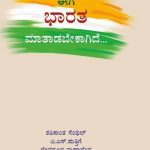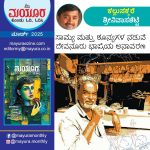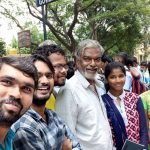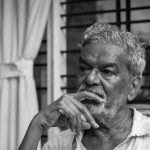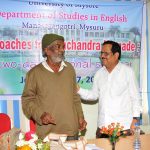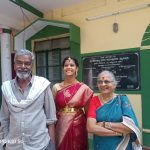Dreaming again-Devanuru Mahadeva
[This editorial written by Devanur Mahadeva on 14.4.2012 as a guest editor for Prajavani titled “Samanatheya kanasannu matte kaanutta” has been translated into English by Prof.Rajendra Chenni. Our thanks to them.ದೇವನೂರ ಮಹಾದೇವ ಅವರು ಪ್ರಜಾವಾಣಿ ಪತ್ರಿಕೆಗೆ 14.4.2012ರಂದು ಅತಿಥಿ ಸಂಪಾದಕರಾಗಿದ್ದಾಗ ಬರೆದಿದ್ದ “ಸಮಾನತೆಯ ಕನಸನ್ನು ಮತ್ತೆ ಕಾಣುತ್ತ” ಎಂಬ ಈ ಸಂಪಾದಕೀಯ ಬರಹವನ್ನು ಪ್ರೊ.ರಾಜೇಂದ್ರ ಚೆನ್ನಿ ಅವರು ಇಂಗ್ಲಿಷ್ ಗೆ ಅನುವಾದಿಸಿದ್ದಾರೆ. ಅವರಿಗೆ ನಮ್ಮ ಧನ್ಯವಾದಗಳು. ]
He was like the burning coal. When he spoke, the heat in his words could be felt.This was Professor M Mariswamy. Born a Hindu untouchable, he died a Buddhist. The interview which he gave to S.Tukaram when he was alive reads as though it is the dalit’s inner world revealed.
An incident narrated in the interview keeps haunting me all the time. Mariswamy was at that time a high school teacher. When he was waiting for the bus to a nearby village sitting in a Lingayath lane, an old man, of the older times by name Kallamballi Madappa came out of his house and pointing a finger at Mariswamy asked his son “ Who is that man sitting there ?” When his son said “ It is the Toddy Madayya’s son, the teacher, sitting there”, foul words came out of old man`s mouth. He reprimanded him saying “ Get up, you” . Recalling the incident, Mariswamy says “ We used to think then that this was the way we had to live.It was only after reading Babasaheb Ambedkar’s writings we understood that it was a ‘wound’. Otherwise until then we had never felt that it was a wound”.
India lies wounded. But it does not feel that its wound is a wound. The wounds of untouchability, caste and communalism are festering and the toxin having risen on its head, India has gone mad. It is this wound, this madness which is being projected in society as culture and tradition. The society also believes that it is so. Half of the ability of every individual born here is exhausting itself struggling with this madness. If there was realisation that it is a wound and it is a madness the society would feel that “The untouchable community, thrown out of the village, has not killed anyone for the reason of caste; has not trodden upon anyone; and has not looked down upon anyone. Therefore instead of this community itself being the object of derision, it should have deserved our respect”. And it would also be seen that among a hundred other reasons for throwing out the untouchables out of the village, it was also the case that thinkers who did not agree with the division of the four varnas and the self respecting individuals who refused to be shudras, that is servants, were also treated as untouchables and were thrown out of the village. The dignity of the past history of the community, thrown out then and now shattered by poverty and humiliation would also be seen. If those subjected to untouchability and discrimination think that pain is “the way of life”, the pain will seem to be material and physical. But when we realise that the pain and discrimination are ‘wounds’ they become abstract and torture us every moment. Then, unable to bear the torture, individuals try to hide the fact that they are untouchables. When they attain the philosophical ability to see their condition on an ideological foundation, they become eager to seek their emancipation. Then the emancipation will not be only theirs; the entire society begins to move in the direction of emancipation.
It is in this context that I had said on an earlier occasion, “Who requires treatment? For those who believe that the disease of high and low discrimination is itself culture – cultural treatment ; for those who believe that discriminatory customs are tradition – social treatment; for the communities from below too weak to rise up against poverty – economic treatment ; this I had said is what we need to give. On the same occasion I had also said that the dalits should organise themselves; should first escape from the disease of inferiority and even while avoiding the blows of the upper community which is stricken with the madness of superiority, should also provide treatment for their madness. That is, my idea was that an organisation should act as the doctor in a mental hospital. If a caste’s getting organised hardens up the caste related customs and and discrimination, that would not be complimentary to the spirit of our constitution. Instead, if that caste organisation can loosen the caste-based customs and discrimination and take it forward, it automatically acquires a moral legitimacy.
What is it that we have lost because of caste? Let us ignore property, status, position, comforts etc. An individual for the reason of being born in a caste loses his sense of justice and truth. Owing to the caste based customs, injustice does not seem to be injustice. He makes his own conscience blind. The joys and sorrows of castes which are not his own do not touch him at all. Sometimes even the happiness of another caste individual may cause distress to him ! His troubles may bring him joy! In sum, his sensibility is struck with leprosy. It cannot respond What have we lost because of caste? It is disturbing. We have become dwarfed and diseased. This seems to me greater than all other losses. Therefore liberating oneself from caste is for guarding the sense of justice and truth in us, for preserving our sensibility, for responding as human beings. That is we have to be secular (casteless) for our own emancipation. We have to sow this attitude at least in our young children who have to lead their lives in the future. Therefore it should become a part of education too.
We find ourselves in a situation wherein even to arouse the Dalits wounded by the caste system and leading a life of agony, who feel that this thing called caste itself should not be there, we have to resort to provoking their caste so that at least a little can be done in that direction. Even if the lower communities awaken and stand upright to protest against the injustice done to them, it can shake up the bindings of the caste system. This process of identity arousing, the process of identity formation is now being subjected to a great deal of discussion. But our discussion should also be about how much of this identity should be there in any field and for what purpose. What is required is the discretion and the awareness of how to preserve secularism even in the process of identifying caste and waging struggles by organising ourselves. This is indeed like a tight-rope walk. What is any identity based organisation for? It is for equality, decentralization and removal of discrimination. The steps we take should be in this direction. Any step involving identity has to realise that it is a stream subject to inequality and the very reason for its existence is to join the river of equality: it has to join other streams which have the same aspiration and flow towards the river of equality. Otherwise it might end up somewhere else or believing that it is all in all may go to extremes and lose its direction. If the egalitarian movements fighting for tribes, women, Dalit internal divisions, minorities and subaltern community and farmers do not possess this awareness, instead of creating unity, they may contribute to seperatism. It is the need of the day that all organisations with aspiration of equality work with this awareness.
This is an urgent need today, because if you look at the pace and direction at which India is moving, it seems as though the dream of those who brought independence to India has become an object of ridicule. People laugh today when anyone speaks of equality. When you say that the gap between rich and the poor should be less, they laugh even more. What then is the India we want ? Mukesh Ambani’s house in Mumbai has twenty seven floors, three helipads, nine lifts, hanging gardens, dance rooms and varieties of air conditioned rooms, gyms, 600 servants. Around this house are thousands of slum huts. Should this be India? Of the one hundred twenty crore Indians, only a hundred wealthy individuals own a quarter of the entire gross national product of India! Where is this taking us?.This does not stop at luxury and wealth. Money in its frenzied dance buys up everything and puts everything on auction. It does not spare anyone. People’s representatives, legislators, members of the parliament, ministers – as though all these are not enough it turns the democratic system upside down and stretches its hands towards judiciary, the executive and the press. So, this is the high time – a ceiling should be fixed on private and corporate property and such property which exceeds the ceiling should be turned into public property. Because A private property whether it is owned by a corporate or anybody grows by using the land, air, light, and other natural resources which belongs to everyone. So we should also seek a system of preservation through which natural resources such as the land air, water and light it has used to create that wealth are available for the country.
Today cities are struggling even to breathe. Villages have lost the stamina to walk. The farmer, our bread giver, is committing suicide. There is only one way for everyone to survive – we have to sow the seeds of equality once again. We have to water the hope that the difference between the rich and the poor should be less. We have to repeat again and again those now sunken words – decentralisation, employment for everyone, self-reliance. When young children are able to speak these old sunken words, then these words may become living again. So,we should first abolish the discrimination in the educational system of these children and through a common school system prepare texts reflecting the aspirations of the constitution – and with these we need to build the India of tomorrow.
[A brief note by the translator: Mahadeva tells me that he spent sleepless nights only to make sure that the writing would be simple. In translating the piece I have tried to retain the speaking tone, the extreme simplicity of the idiom and the metaphors through which he thinks. If there are awkward turns of phrase in the translation, the credit should go to the translator!- Rajendra Chenni]

